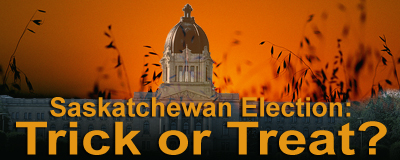Winds of Change Blow Through Saskatchewan
After 16 years of NDP rule, Saskatchewan voters decided it was finally time for change. The Saskatchewan Party, created in 1997 by Progressive Conservatives and Liberal MLAs who left their respective parties, received its first ever mandate, winning 37 seats over the NDP's 21. And, if leader Brad Wall holds true to his platform, tax relief and government reform is on its way.
The new government plans to increase rebates on property taxes-a welcome step in the right direction. Saskatchewan relies more heavily on property tax to fund education than any other province-a whopping 55 percent. The ten percent rebate initiated by the NDP will increase for homeowners and businesses to 12, 15, 17, and 20 percent respectively over the next four years. Most important, the rebate on agricultural land will increase from 38 to 80 percent over the same period. The Canadian Taxpayers Federation has long advocated that 75 percent of education funding come from provincial revenues, with the remainder made up from the property tax base.
Unfortunately, no other broad-based cuts are promised. All seven of the Sask Party's tax cuts are the 'boutique' variety, targeted in specific ways. However, many are directed towards encouraging industry and under-30 population growth, which, if successful, will bring a welcome broadening of the tax base. The Sask Party estimates a total saving of $407.4 million over four years for some, but not all, taxpayers.
On the spending side of the ledger, the Sask Party's platform promises almost $1.3 billion in new spending over four years (including the cost of property tax rebates). Instead of rescinding the NDP's ill-conceived and costly $15 limit on drugs for seniors, it limited it to those making less than $64,000 and added youth under 15 to the list. It will also spend $40 million over four years to add more drugs to the provincial plan, and spend $272.4 million on the recruitment, retention, and training of nurses. Bonus money to education, municipalities, highways, policing, and the environment will all follow. A key promise was to pay off $250 million of the provincial debt within the first year in power.
The new government has pledged to make itself accountable through a Saskatchewan Growth and Financial Security Act. The act would require the budget to be balanced every year instead of every four years as is now the case, and dedicate half of all future surpluses to reduce the provincial net debt of $6.7 billion. It will also limit the size of the civil service to the rate of population growth. Furthermore, government departments and agencies will have to review all programs and services each year to ensure they are working efficiently.
Proposed government reforms don't stop there. The Sask Party has pledged to bring in fixed election dates, and restrict government advertising in the months leading up to an election. It would place all orders-in-council online so that the public could easily review government appointments. The provincial auditor would be given expanded powers to ensure current service agreements are complied with. Public servants and whistleblowers would be protected by establishing a Public Integrity Commissioner. And crowns would regularly report to the legislature.
While many of these ideas are welcome, taxpayers beware. The new government has committed to many costly new spending items that could easily spiral upwards. Pro-growth strategies require broad-based tax cuts-not the boutique variety on offer by the Sask Party. The CTF welcomes the new government but will continue to push for tax relief for all taxpayers and ensure those promises made in the election are promises kept in government.

The following is the list of articles, the CTF released in connection with the provincial election held November 7th, 2007: